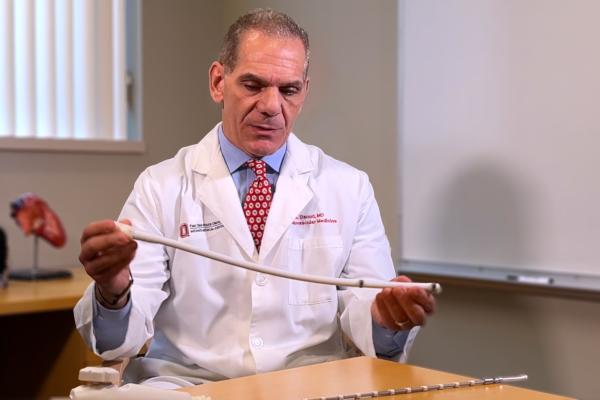
Emile Daoud, MD, helped develop a new surgical device at The Ohio State University Wexner Medical Center to prevent a common and serious complication during heart ablation procedures. The device gently moves the nearby esophagus away from the heart to prevent the ablation energy from causing damage. Image courtesy of The Ohio State University Wexner Medical Center
August 23, 2023 — Atrial fibrillation, or AFib , is the most common heart rhythm problem, affecting millions of Americans and greatly increasing their risk of stroke and heart failure. For some with AFib, a catheter ablation is used to burn or freeze the precise area causing the problem to restore a normal heart rhythm. While this method is effective in treating AFib, the energy from the catheter tip can cause serious damage to the adjacent esophagus, which is only a few millimeters away. It’s an injury that can be life threatening, so an electrophysiologist at The Ohio State University Wexner Medical Center helped develop a new device that gently diverts the esophagus out of harm’s way, greatly improving safety.
“On one hand, we want to deliver high energy and spend a lot of time ablating a specific spot to get a good, deep lesion. But on the other hand, we are very cognizant of where the esophagus is and want to do everything possible to avoid damaging that structure,” said Emile Daoud, MD, electrophysiologist and clinical professor of internal medicine at the medical center. “By pulling in the esophagus using suction force and then moving the entire segment to the side by about an inch, we are able to create a safe pathway to deliver the energy to treat AFib.”
A clinical trial led by Ohio State found that without the device, over a third of heart ablation patients had esophageal injuries, but when the new device was used, less than 5% of patients had any injury to the esophagus, and they were much less severe than the control group.
“There have been attempts to protect the esophagus during heart ablations in the past using different techniques like measuring the temperature inside the esophagus, using ultrasound imaging to identify where it’s located and using shorter or less intense ablation energy, but esophageal injury continued to be a serious problem,” said Daoud. “With this device, patients can rest assured that they are getting the safest procedure possible without compromising any benefits to their heart.”
For more information: https://wexnermedical.osu.edu/


 February 03, 2026
February 03, 2026 









